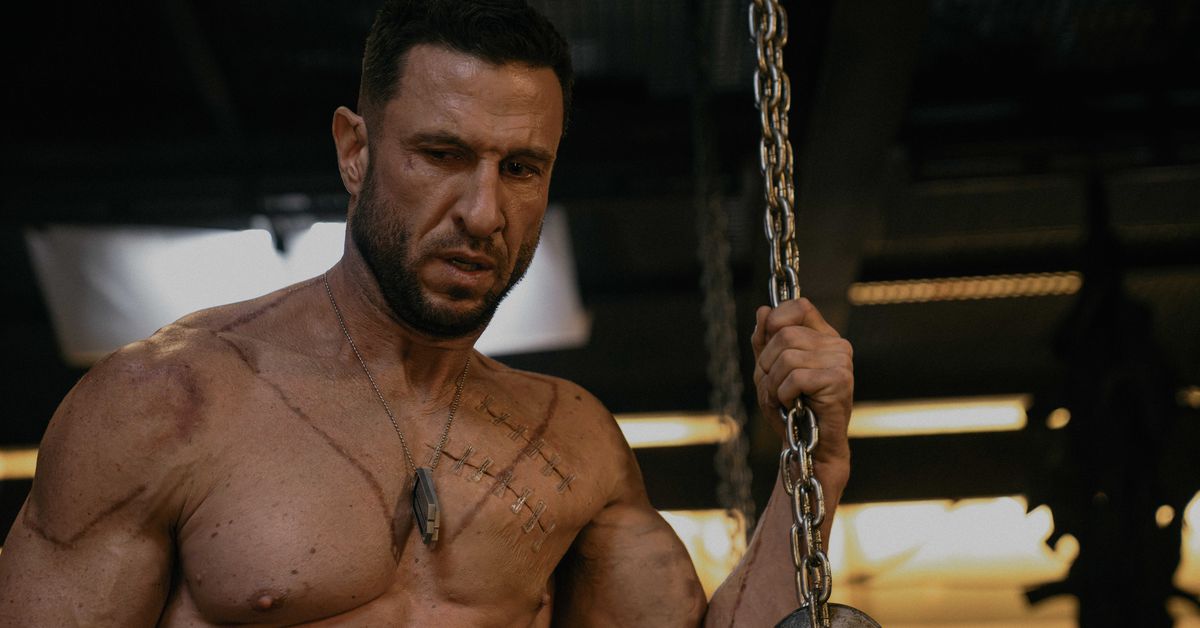Reach has fallen in the Halo TV universe. If you know anything about the lore of the Halo games, you know that the next thing that’s supposed to happen is Master Chief escaping from Covenant forces above Reach, his ship getting attacked, and then promptly crashing onto the series’ first Halo ring. In other words, this is basically the moment where the action starts. That is not what happened in the Halo TV series. Instead, Chief (Pablo Schreiber) and his friends took a reflective excursion to a backwater planet that felt a lot more like a detour than character development.
After escaping Reach, Chief and everyone else on the escape ship with him (which is basically all of the still-living series regulars except for Kate Kennedy’s Kai), visit Aleria, a small dirt farming planet with plenty of land to spare and nearly toxic soil. After an episode as big and exciting as the Fall of Reach, this feels like a very HBO-style respite: the kind of episode dedicated to taking stock of the characters we lost and examining the new shape of the world after a big shake-up. But those shows earn those reflective episodes with consistent quality before them, and they tend to make those quiet episodes feel ever bigger and more important than the loud ones. That was certainly not the case in Halo season 2’s fifth episode.
:no_upscale()/cdn.vox-cdn.com/uploads/chorus_asset/file/25311676/Halo_s2ep5_pt_3.jpg)
Photo: Adrienn Szabo/Paramount Plus
In defense of the Halo series’ entire premise, it has no obligation to follow the events of the games directly. Since the show’s announcement, the creative team behind it has been careful to specify that this series takes place in the “Silver Timeline,” which is completely separate from the canon of the games. So going somewhere other than Halo after the Fall of Reach isn’t really a problem. The problem is that the show once again fails the most basic and important test of doing interesting things with those changes.
The series seems convinced that the audience loves and cares about its side characters. But they’re just not interesting. During this episode the most coherent plotline we spend time with involves Soren (the wonderful Bokeem Woodbine, trying his best as always) and his wife searching for their child. We see them question various people around the village, and even find someone they think is keeping their kid from them. But by the end of the episode, they discover that he was actually kidnapped by the UNSC — an organization we almost exclusively know at this point as the military that loves kidnapping children. It’s a bland, “no shit” reveal that feels both too obvious and totally meaningless at the same time. Another of the episode’s plotlines involves Riz, a Spartan who was introduced just a few episodes ago, deciding that she wants to be a farmer now that she is too injured to be a Spartan.
With plotlines this boring, about characters that the show never really does a good job of convincing us to care about, it’s getting awfully hard not to long for the circular perfection and alien weirdness of the Halo rings that give this franchise its name. So why aren’t we there yet?
The answer seems to lie in the Halo show’s approach to the rings in general. The series clearly recognizes one of the great strengths of the first game was that Halo was profoundly mysterious. But the show is approaching that mystery in a very different way than the original game did.
:no_upscale()/cdn.vox-cdn.com/uploads/chorus_asset/file/25311682/Halo_s2e5_pt_1.jpg)
Photo: Adrienn Szabo/Paramount Plus
For the game, the mystery of Halo was in how little information you had about both the alien ring and the video game’s world. Aside from the basic premise of humanity being on the back foot in a war against aliens, almost everything else was a black box. So when you crash-land on Halo in the game’s second level (a level also called “Halo”), the path is clear for the game to slowly reveal its secrets about Forerunners, the Covenant religion, the Flood, 343 Guilty Spark, and everything else that feels commonplace in the series today. The TV series, on the other hand, decided to make Halo a destination. Instead of giving us no lore, it’s been stacking up piles and piles of lore through its first two seasons and dangling the Halo ring in front of his via characters’ prophetic visions. This path to Halo isn’t inherently bad; a well-done buildup and reveal can make for a fantastic moment in a TV show. But like the Hatch in Lost, the key is that you have to show the audience why the thing is mysterious and important — you have to really prove it to us, not just have characters bombard us with insistent dialogue that it matters. And more importantly, the characters actually have to get into it eventually.
None of this is to say that the show has run out of time to make it to Halo, or even that it can’t be good once it gets there. But it is to say that the journey there so far has felt profoundly misjudged and way too slow, and it’s starting to feel like it might not happen at all. In this episode, Makee (Charlie Murphy) tries to convince the Arbiter to go to the Halo rings because she insists that the Prophets are lying about the Great Journey, telling the rest of the Covenant fanciful stories about its importance and transcending the physical realm, but never actually planning to take them along on their trip to divinity. Now, I’m not saying that the Halo series is the Prophets and we’re the rest of the Covenant, but I am saying that our lack of a journey to a Halo ring is starting to feel a little suspicious, and they’re running out of time to convince me we’re really going.

